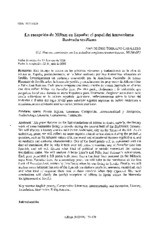Mostrar el registro sencillo del ítem
La recepción de Milton en España: el papel del humanismo ilustrado sevillano
| dc.contributor.author | Torralbo Caballero, Juan de Dios | |
| dc.date.accessioned | 2023-05-24T12:16:20Z | |
| dc.date.available | 2023-05-24T12:16:20Z | |
| dc.date.issued | 2008 | |
| dc.identifier.issn | 2386-9658 | |
| dc.identifier.uri | http://hdl.handle.net/10396/25396 | |
| dc.description.abstract | Este trabajo se centra en las primeras versiones y traducciones de la obra de Milton en España, particularmente, en la labor realizada por tres humanistas afincados en Sevilla. Investigaremos un certamen convocado por la Academia Particular de Letras Humanas de Sevilla sobre la inocencia perdida y estudiaremos las propuestas de Alberto Lista y Félix José Reinoso. Cada poeta compone una tirada amplia de versos inspirada en el tema que desarrollara Milton en Paradise Last. Por otra parte, aludiremos a la traducción que pergeriara Jovellanos durante su etapa hispalense para, finalmente, desglosar otros datos de la estela miltoniana en la cultura española. Asimismo, reflexionaremos sobre la labor del traductor a finales del siglo XVIII para subrayar algunos aspectos de índole traductiva o relacionados con el ideario estético de los propios escritores. | es_ES |
| dc.description.abstract | This paper focuses on the first translations of Milton in Spain, namely, the literary work of three humanists living in Seville during the second half of the Eighteenth Century. We will discuss a literary contest held in the Andalusian city on the theme of the fall. As an underlying point, we will reflect on some aspects related to translation during the period in question, such as the intrinsic values of it, the moral and educational features applied to it, and its aesthetic and authorial characteristies. One of the focal points will be concerned with the date of translation, that is, why it took over 100 years to translate any of Paradise Last into Spanish, and we will discuss what kind of political or artistic statements the various translations make. We will analyse Alberto Lista's and Félix José Reinoso's submissions. Each poet presented a full poem with more than a hundred lines centered on the Miltonic topic from Paradise Last. As a secondary point, we will refer to the translation of the first book of Paradise Last, written by Jovellanos when he was living in Seville, Finally, we will analyse some inherent features of the Spanish translations (stylistic, semantic, contextual, etc) and what kind of response there was to these versions when they appeared. The main conclusions will clarify the (early) reception of Milton in Spain within the Humanist Enlightenment in Seville. | es_ES |
| dc.format.mimetype | application/pdf | es_ES |
| dc.language.iso | spa | es_ES |
| dc.publisher | UCOPress | es_ES |
| dc.rights | https://creativecommons.org/licenses/by/3.0/ | es_ES |
| dc.source | Alfinge 20, 121-170 (2008) | es_ES |
| dc.subject | Poesía inglesa | es_ES |
| dc.subject | Literatura Comparada | es_ES |
| dc.subject | Intertextualidad y Recepción | es_ES |
| dc.subject | Traductología Literaria | es_ES |
| dc.subject | Humanismo | es_ES |
| dc.subject | Ilustración | es_ES |
| dc.subject | English poetry | es_ES |
| dc.subject | Comparative Literature | es_ES |
| dc.subject | , Intextextuality and Reception | es_ES |
| dc.subject | Literary | es_ES |
| dc.subject | Translation | es_ES |
| dc.subject | Humanism | es_ES |
| dc.subject | Enlightenment | es_ES |
| dc.title | La recepción de Milton en España: el papel del humanismo ilustrado sevillano | es_ES |
| dc.type | info:eu-repo/semantics/article | es_ES |
| dc.relation.publisherversion | https://www.uco.es/ucopress/ojs/index.php/alfinge/index | es_ES |
| dc.rights.accessRights | info:eu-repo/semantics/openAccess | es_ES |

